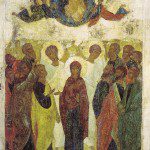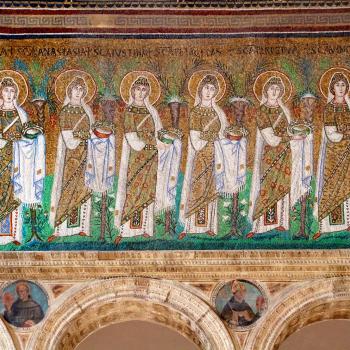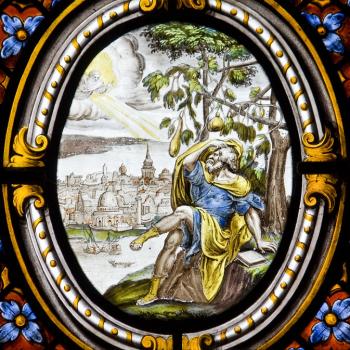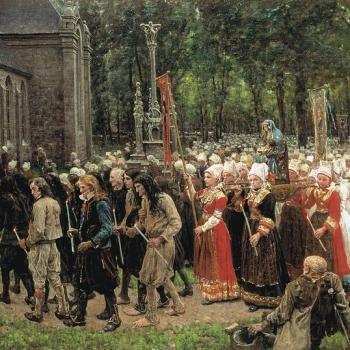![By Giotto (original fresco), SimonP (image from PD), Trelawnie (excerpt) (Public domain) [Public domain], via Wikimedia Commons](https://wp-media.patheos.com/blogs/sites/637/2016/04/Giotto_Flight_into_Egypt_excerpt-300x295.jpg)
In our current cultural milieu, we find people often question the perpetual virginity of Mary based upon the way society as a whole has changed its understanding of virginity. In earlier eras, there was a greater awareness as to the value of virginity, as a special and holy calling which tries and purifies those who live it out throughout their lives. Today, with the way sex is often worshiped as a good and holy end in and of itself, it becomes that much harder for some to see why Mary would forgo something so good and holy for herself, and so many take all the questions which we have addressed and try to use them to explain why they think the Christian tradition has got Mary wrong. Hopefully, the weakness of those questions, the prophetic witness about her being a virgin and the fittingness of her virginity in relation to the economic Trinity have provided some explanation which, even if they still feel it is odd, they can at least see the relevance of the dogma itself.
And yet there is also much which can be said of the dogma as it relates to modern question of the value of women and the rights and dignity they should be seen to have. Mary, according to the tradition (such as seen in the Protoevangelium of James and many other early sources), chose from an early age to dedicate herself to God, foregoing normal life with worldly concerns. She had perfect freedom to make that choice, to choose for herself what she would do with her life apart from the dictates of her society, and therefore, apart from the dictates that any man would make for her. To choose, as she did, a life of perpetual virginity was at once a risk, because single women, like widows and orphans, hardly had much of a safety net to protect them from unforeseen disasters. Such a choice was also a challenge, because she was human and would face human desires like the rest of us. Likewise, such a choice also served as a form of liberation, because by it she chose to be free from the normal constraints placed upon a woman in her time and place.[1] She, who was free from sin, dedicated her life to God so that she could remain free, that is, so she would not be bound by the normal bonds put upon women which come out of and from a society tainted by sin. Her life was lifted up above the normal concerns of society, as it was a life open to love — a love for others unconstrained by the domains of concupiscence, even as it was a love for God, so pure, that she could be open to receive the full fruit of that love in her womb in the conception of Jesus.
Mary, in her virginity, therefore represents the pure freedom of one filled with grace, showing the freedom which we all can have with grace. It can be, and should be, and was given to women, indeed, it was given to a woman first, to Daughter Zion. The dignity of restored humanity is found first and foremost with a woman, the new Eve, the one who chose God over earthly cares and desires. Filled with grace, filled with the Holy Spirit, like the Holy Spirit who she mystically represents, she was free to go as she wills, and her will was, like the Holy Spirit, to always act in and through pure love. She showed us true freedom is found in love, even as pure love offers freedom. She had a true freedom in a time and age when no one, but especially women, had it. By grace, she had more authority over herself, over her body, than any other women at any other time; to remove her virginity and take her choice away from her would be the same as denigrating her and the authority she had to act and choose and go as she willed. And by denigrating her, by trying to limit her freedom by putting the passions of concupiscence over her, not only is she denigrated, but women are denigrated in and through her subjugation, because she is turned from the perfectly free subject to a mere objection of the passions, and all women through her, find such objectification justified if the perfectly free woman can be chained down by such an imposition. Those who do not see clearly her perfect freedom and desire to remain pure in that freedom want to remove the full control she had over herself so that they can then deny all women such freedom as well. And it does not stop with women: once women are forced into the chains of objectification, men are next, for they become mere objects of their desires, their passions as well.
Mary gave herself freely to God in love, and God rewarded her freedom with the bounty of womanhood, a child of her own, while allowing her to also remain free. It was not forced upon her – she was given perfect freedom and the choice to accept out of love the gift God was willing to give to her. Her freedom was never violently taken away from her, she had no demands placed upon her by a husband to bare children for him. In this way, we must see that she assented to God in her freedom, and by doing so, she received even more grace so as to be able to preserve her virginity with her virginity after the birth of Christ, and therefore, she preserved her freedom even after the birth of Christ. In this fashion, St. Fulgentius wrote:
Consequently the Virgin ineffably conceived and bore the God of heaven, and the Virgin Mother remained inviolate – after all, an angel had truthfully proclaimed that she was full of grace and blessed among women. By the power and work of prevenient grace, the Holy Spirit came over her and the power of the Most High overshadowed her. As she was about to conceive the one who was God and the Son of God, she neither desired nor engaged in intercourse, but instead, while maintaining her virginity in both mind and body, she received from him what she was to conceive and give birth to, by a gift of uncorrupted fertility and fertile purity.[2]
The fruit of love, Jesus, was born out of true freedom; his conception did not hinder nor in any way corrupt the freedom which Mary had due to grace. It was out of love, not out of force, nor social compulsion, nor out of the bonds of human passion, that we find she accepted her role as the Mother of God. Her freedom remained, even in her giving birth to Jesus; this is a part of the truth which is handed to us in the teaching of her perpetual virginity. She was unviolated, her freedom remained pure. Throughout her life she was free and what she did she did in and through her freedom without any external imposition. Her betrothal to Joseph was itself established to help preserve and protect her virginity – and so her freedom, as well as to help her protect and raise Jesus, and his own freedom, until the time came for him to fulfill his mission in the world. She was the perfectly free woman – and in her choice to remain a virgin, she showed us a way for us to understand what freedom is truly about.
[1] Many women would, throughout time, choose to remain virgins for this very reason: to be free, to be able to live life as they chose.
[2] St. Fulgentius, First Letter to the Scythian Monks in Fulgentius and the Scythian Monks: Correspondence on Christology and Grace. Trans. Rob Ray McGregor and Donald Fairbairn (Washington, DC: Catholic University of America Press, 2013), 53.
Stay in touch! Like A Little Bit of Nothing on Facebook:
A Little Bit of Nothing

















